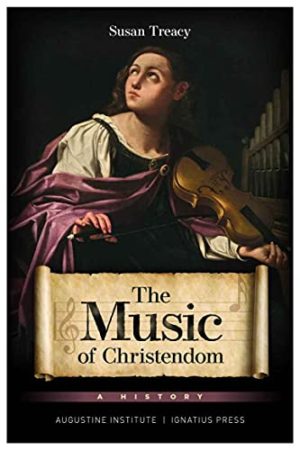The Music of Christendom: A History
Susan Treacy (Ignatius Press, $16.95, 235 pages)
 ”It behooves us,” says Susan Treacy, professor of music at Ave Maria University and music columnist for St. Austin Review, “to immerse ourselves in music of the Western classical tradition, which is so imbued with the beauty of Christ. This is our music!” In The Music of Christendom: A History, Treacy provides an accessible, wide-ranging, and brief (sometimes too brief – J.S. Bach gets a mere six pages) survey of western music and its myriad connections to Christianity (by which the author usually means Catholic). One need not have any training in music to understand her tour of the development of western music from pre-Christian times through the Middle Ages to the 20th century. This slim volume differs from Mike Aquilina’s 2016 book, How the Choir Converted the World: Through Hymns, With Hymns, and In Hymns which looked at how the Christian church engaged the world through sacred and liturgical music, with Treacy instead looking at how ideas of the sacred influenced the creation of music. One will learn much about obviously religious music — Gregorian chant, Palestrina, Tallis, Byrd, Handel and Bach — as well as the religiously influenced music of not so overtly Christian composers (Mozart). She writes about how Gabriel Fauré, a barely practicing Catholic, wrote a great Requiem and how the non-practicing Anglican Benjamin Britten wrote sacred music that exemplifies the “splendor” of God. Treacy sides more with the ancient and medieval view “of music as something of cosmic importance” over the view of the 18th century’s Charles Burney who found music “an innocent luxury, unnecessary, indeed, to our existence, but a great improvement and gratification of the sense of hearing.” Listening to Beethoven’s instrumental music, she writes, “is to be immediately aware of its more intense effect on the motions, of its sublimity, its grandeur, and its nobility.” Treacy provides “100 essential masterworks of classical music: a starter list” that again skimps on Bach, but otherwise provides a sweeping introduction to the music of Christendom.
”It behooves us,” says Susan Treacy, professor of music at Ave Maria University and music columnist for St. Austin Review, “to immerse ourselves in music of the Western classical tradition, which is so imbued with the beauty of Christ. This is our music!” In The Music of Christendom: A History, Treacy provides an accessible, wide-ranging, and brief (sometimes too brief – J.S. Bach gets a mere six pages) survey of western music and its myriad connections to Christianity (by which the author usually means Catholic). One need not have any training in music to understand her tour of the development of western music from pre-Christian times through the Middle Ages to the 20th century. This slim volume differs from Mike Aquilina’s 2016 book, How the Choir Converted the World: Through Hymns, With Hymns, and In Hymns which looked at how the Christian church engaged the world through sacred and liturgical music, with Treacy instead looking at how ideas of the sacred influenced the creation of music. One will learn much about obviously religious music — Gregorian chant, Palestrina, Tallis, Byrd, Handel and Bach — as well as the religiously influenced music of not so overtly Christian composers (Mozart). She writes about how Gabriel Fauré, a barely practicing Catholic, wrote a great Requiem and how the non-practicing Anglican Benjamin Britten wrote sacred music that exemplifies the “splendor” of God. Treacy sides more with the ancient and medieval view “of music as something of cosmic importance” over the view of the 18th century’s Charles Burney who found music “an innocent luxury, unnecessary, indeed, to our existence, but a great improvement and gratification of the sense of hearing.” Listening to Beethoven’s instrumental music, she writes, “is to be immediately aware of its more intense effect on the motions, of its sublimity, its grandeur, and its nobility.” Treacy provides “100 essential masterworks of classical music: a starter list” that again skimps on Bach, but otherwise provides a sweeping introduction to the music of Christendom.




